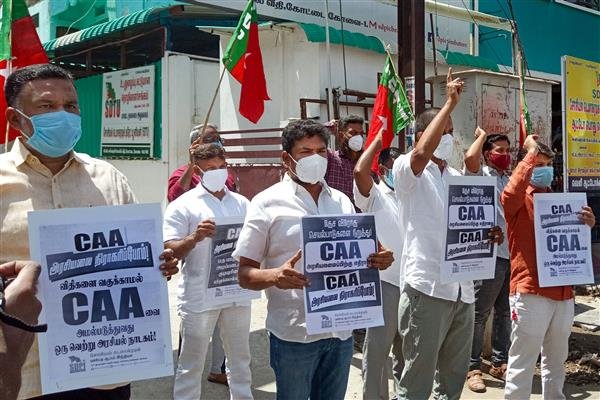`The Citizenship Amendment Act (CAA) has been a contentious issue in India since its passage by the Parliament in 2019. On Monday, the Union Home Minister notified the rules for its implementation, marking a significant development in the ongoing debate surrounding the legislation.
The CAA expedites the citizenship process for six religious minorities – Hindu, Sikh, Buddhist, Jain, Parsi, and Christian – who migrated to India due to religious persecution in their countries. These minorities primarily hail from neighboring nations like Afghanistan, Pakistan, and Bangladesh.
Here are five key facts about the CAA and its implementation rules:
- Eligibility Criteria: The rules dictate that individuals belonging to the six specified religious minorities, who faced persecution in Afghanistan, Pakistan, and Bangladesh, and migrated to India before December 31, 2014, are eligible to apply for Indian citizenship under the CAA. This provision aims to provide relief to those who have been subjected to religious discrimination and violence in their home countries.
- Residency Requirement: The CAA reduces the residency requirement for eligible individuals from these religious minorities from 11 years to 5 years. This means that those who migrated to India before December 31, 2014, and have lived in the country for at least five years are eligible to seek Indian citizenship. By shortening the residency period, the CAA aims to facilitate the integration of persecuted minorities into Indian society.
- Online Application Process: The implementation rules specify that applications for citizenship under the CAA will be submitted entirely online through a designated web portal. This digital platform streamlines the application process and ensures efficiency and transparency in the citizenship-granting procedure. It also reflects the government’s efforts to modernize administrative processes and embrace digital governance practices.
- Protection of Indian Citizenship: The Home Ministry clarified that the CAA does not affect the citizenship status of any Indian citizen. It emphasizes that the legislation is intended to assist individuals who have faced religious persecution and have sought refuge in India. This assurance aims to alleviate concerns about the legislation’s impact on the citizenship rights of Indian nationals and reaffirms the government’s commitment to upholding constitutional principles of equality and justice.
- Controversies and Protests: Despite the government’s assertions, the CAA has been met with widespread protests and criticism across India. Critics argue that the legislation discriminates against Muslims by excluding them from its purview, thereby violating the principles of secularism and equality enshrined in the Indian Constitution. The exclusion of Muslims from the list of eligible religious minorities has sparked concerns about communal polarization and discrimination.
The implementation of the CAA has been a subject of intense debate and legal scrutiny, with various petitions challenging its constitutionality pending before the courts. Critics contend that the legislation undermines India’s secular fabric and discriminates against marginalized communities, particularly Muslims. On the other hand, supporters argue that the CAA fulfills a humanitarian objective by providing refuge to persecuted religious minorities facing persecution in neighboring countries.
The notification of rules for implementing the Citizenship Amendment Act represents a significant step in the government’s efforts to address the concerns of persecuted religious minorities. However, the CAA remains a contentious issue, reflecting broader debates about identity, citizenship, and secularism in India. As the legislation continues to face legal challenges and public scrutiny, its impact on India’s social fabric and political landscape remains a subject of ongoing discussion and debate.
